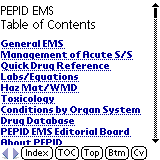 |
|
|
|
PEPID is the acronym for Portable Emergency & Primary Care Information Database. There are six PEPID products available for handheld devices-PEPID ED for emergency physicians, PEPID MD for all physicians, PEPID MSC for medical students, PEPID RN for clinical nurses, PEPID PDC drug companion, and PEPID EMS for emergency personnel. PEPID EMS , the newest product released, is an extensive database for use by prehospital care providers.
Installation and Memory Requirements I was able to easily load PEPID EMS to my Palm m515. The file size for the Palm OS is 3.8 MB, but I was able to place most of the data on my expansion card. The file size for the Pocket PC is 5.1 MB. I have PEPID RN and PEPID EMS on my handheld and both programs are listed under PEPID in my Palm menu. Clicking on PEPID then allows me to choose either the RN or EMS application. PEPID also has the option to purchase programs for PC or laptop. The staff at PEPID is very knowledgeable and helpful. Any difficulties are handled promptly and efficiently and I felt I had personalized service. Ease of Use and Navigation There are two ways to access information within PEPID EMS, via the table of contents or the index. I have found the table of contents to be fast and efficient when doing research. The index is a bit slower but certainly useful in locating more obscure information. Eight major areas are included in the table of contents. The first area is General EMS and includes subjects specific to EMS including triage, scene safety, extrication and transport. Frequently used EMS procedures are explained. Information is given on medical/legal and infection control issues. Guidelines and protocols contain ACLS algorithms, trauma scores, stroke scales and burn equations. When responding to an emergency situation there is an advantage to two separate databases for illness or injury. The first database discusses Management of Acute Signs and Symptoms and the second discusses Condition by Organ Systems. This allows the prehospital provider options for accessing information on patient conditions. Both areas are detailed, presenting all facts needed when providing care. There are two areas for drug reference. The Quick Drug Reference provides information on drugs used in emergency situations, while the Drug Database includes facts on over 1400 prescription drugs, OTC drugs, food supplements, and herbal remedies. With PEPID EMS there is no need to purchase another drug guide. An added benefit of the drug guides includes the built-in, weight-based calculators that determine dosages. This is certainly another safeguard in preventing medication errors. The last areas in the table of contents include Labs and Equations, Hazmat and Weapons of Mass Destruction, and Toxicology. These are essential topics for every prehospital practitioner and are covered comprehensively. Value PEPID products are sold by subscription. Unlimited updates are available during the subscription period. Updates seem to occur every 2-3 months. PEPID EMS subscriptions are 6 months for $59.95, 12-months for $89.95 and 24-months for $139.95. The value is enhanced further by the addition of PEPID PRC with a comprehensive guide to biological, nuclear and chemical weapons, as well as the full drug database. Purchasing a new drug guide separately each year is equivalent to at least $45.95. One big plus is that PEPID allows a one-month free trial to determine if the application is right for you. The Downside I don't know if it is because I have so many applications loaded on my Palm, but I find that opening PEPID is very slow. Once I have the application open I am able to find information quickly. When updating the program, the procedure is to remove the previous PEPID EMS and then download the updated version. This makes me nervous. Although I had no difficulty, I fear losing the program. I would also like to have e-mails telling me when updates are available. Summary and Recommendations PEPID EMSis the most comprehensive prehospital database I have
seen. It could be used as a review on the way to a call or for
learning during downtime. Research has shown point-of-care access
to healthcare information is an effective way to decrease errors.
PEPID EMS provides essential resources to supplement the knowledge
of the prehospital provider. Cindy can be reached by email. Get your copy of PEPID EMSfor the Palm OS here and for the Pocket PC here A complete listing of PEPIDproducts is available here
Related links:
|
|||||||||


